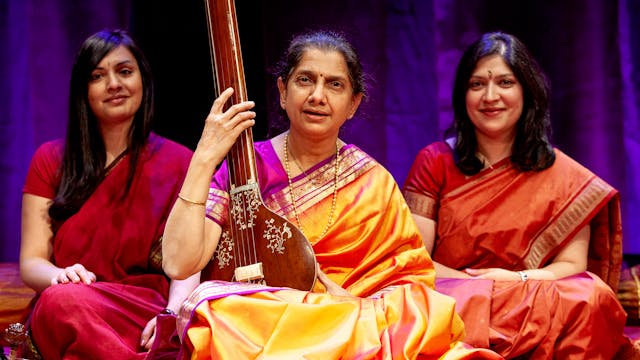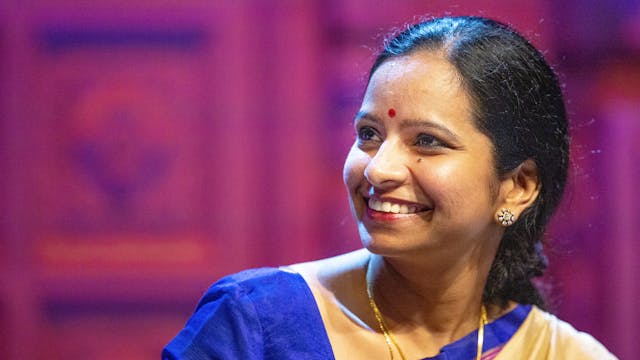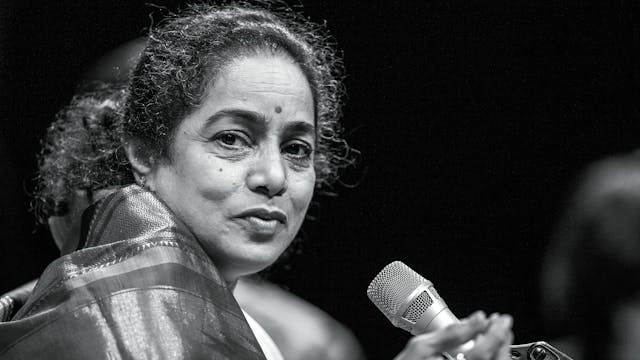Pandit Venkatesh Kumar | Full Concert
Full Concert
•
1h 33m
Recorded on Darbar Festival 2010, on 14th April, at King's Place, London.
Musicians:
- Pandit Venkatesh Kumar (khayal)
- Satyajit Talwalkar (tabla)
- Murad Ali (sarangi)
- Tofail Ahmed (harmonium)
- Roopa Panesar & Gunwant Dhadyalla (tanpuras)
Music Pieces:
- Raag Multani, Thaat: Todi, Samay: Late Afternoon
- Raag Patdeep, Thaat: Kafi, Samay: Afternoon
- Raag Khamaj, Thaat: Khamaj, Samay: Afternoon
- Raag Durga, Thaat: Bilawal, Samay: Night
This performance went off with the intensity and dazzle of a rocket. In 2010, Pandit Venkatesh Kumar hadn’t received his visa till a couple of days before his performance. His flight landed half a day prior to his going on stage, bringing the nail-biting situation to rest.
We were particularly excited because this was his international debut – the first time audiences outside India would experience his live performance. Pandit Kumar’s evocative voice, simplicity and elegance is extraordinary. He had been an active performer and teacher in India, but reticent in his own way. While the audience didn’t know what to expect, we weren’t surprised to see jaws drop already when he was just halfway through the first raga.
Pandit Kumar teaches music at the University College of Music, Dharwad, and has authored text books that comprise the syllabus of colleges in south-western India. He is also a recipient of the highest civilian award from the government of India for his contribution towards the folk repertoire of his region.
Satyajit Talwalkar’s sensitive approach to the tabla coupled with individualism and confidence reflects the exceptional training he has received from his father and guru, Pandit Suresh Talwalkar.
Murad Ali’s support on the sarangi tugs at one’s heart’s strings. Tofail Ahmed gives a beautiful and restrained support on the harmonium, allowing the vocal elements to emerge in full beauty.
Pandit Kumar begins with Raag Multani in vilambit Ektaal which he expands to 48 micro-beats, embellishing the composition with bol-banav and taans. The faster composition in Teental is exuberant with his regal voice weaving elegant improvisations.
The second raga, Patdeep, is an awe-inspiring rendition in Jhaptaal. Pandit Kumar sings a blend of Kirana, Gwalior and Patiala styles. While the vistar follows an introverted format of the Kirana progression, the laykari is an outstanding imprint of the Gwalior gharana. The taans carry flashes of the Patiala and Carnatic influences making his recital a bouquet of stylistic combinations. He concludes this part with another composition in drut Teental.
The next piece, a thumri in Raag Khamaj, “Ab kaise ghar jawoon”, (How do I go home now?) follows the theme of a playful, romantic interaction between the Hindu flute-playing deity, Lord Krishna and his consort Radha. Folklore has many descriptions of Radha being teased by Krishna on her way home after drawing water from the river. Most of these descriptions centre around the social fabric of ancient India, where a man’s public display of affection or flirtation would leave a woman ostracised by society and her family. This thumri narrates the coy requests of Radha to Krishna to stop teasing her in public so that she may return home without any loss of reputation.
Pandit Kumar concludes his recital with Raag Durga, a rarely sung melody. The composition is in a faster tempo of Teental which he delivers with a heroic brilliance. He elaborates on the beautiful pentatonic raga with a deluge of lively taans and laykari.
Up Next in Full Concert
-
Veena Sahasrabuddhe | Director's Cut
Recorded at Darbar Festival 2010 on 3rd April, at King's Place, London.
Musicians:
- Veena Sahasrabuddhe (khayal)
- Sanju Sahai (tabla)
- Tofail Ahmed (harmonium)
- Priya Parkash (tanpura)
- Shobhana Patel (tanpura)Ragas:
- Ahir Bhairav, Thaat: Bhairav; Samay: Morning
- Shudh Sarang, Thaat:... -
Jayanthi Kumaresh | Full Concert
Recorded at Darbar Festival 2013, on 20th September, at the level 5 function Room of the Royal Festival Hall, at London's Southbank Centre.
Musicians:
- Jayanthi Kumaresh (Saraswati veena)
- Patri Satish Kumar (mridangam)
- RN Prakash (ghatam)
- Mithila Sarma (tanpura)Music pieces:
- Raag ... -
Shruti Sadolikar-Katkar | Full Concert
Recorded at Darbar Festival 2012, on 29th September, at London's Southbank Centre.
Musicians:
- Shruti Sadolikar-Katkar (Jaipur-Atrauli Gharana)
- Vishwanth Shirodkar (Tabla)
- Murad Ali (Sarangi)
- Tanmay Deochake (Harmonium)
- Ranjana Ghatak (Tanpura)
- Shobhana Patel (Tanpura)“Have you eve...



